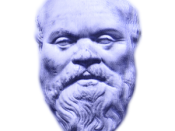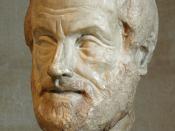The need to understand organisms has been a much sought goal of science since its birth as biology. History shows Aristotle and Charles Darwin as two of the most powerful biologists of all time. Aristotle's teleological method was supported widely for over 2,000 years. One scientist remarks that the Aristotelian teleology 'has been the ghost, the unexplained mystery which has haunted biology through its whole history' (Ayala, 10). If Aristotle's approach has frightened biology, then Darwin, who actually nicknamed himself the 'Devils Chaplain,' and his idea of natural selection has virtually dissected Aristotle's ghost. While Aristotle explained biology through a plan and a purpose, Darwin debated that randomness and chaos are responsible for the organic world as we know it. Guiseppe Montalenti, an Italian geneticist and philosopher of biology, wrote that Darwin's ideas were a rebellion against thought in the Aristotelian-scholastic way (Ayala, 4). In order to understand how Darwinism can be considered a revolt against Aristotle, we must first inspect Aristotle's ideas and thoughts about biology.
Aristotle used teleology to explain the harmony and final results of the earth. Teleology is the study of the purpose of nature. Aristotle believed that scientists should follow the plan adopted by mathematicians in their demonstrations of astronomy, and after weighing the phenomena presented by animals, and their several parts, follow consequently to understand the causes and the end results. Using this method, Aristotle constructed causes for body parts and processes of the human body, such as sundry types of teeth. Aristotle elucidated on this topic: 'When we have ascertained the thing's existence we inquire as to its nature...when we know the fact we ask the reason' (Evans, 82).
Despite Aristotle's frequent teleological explanations, he did warn against teleology leading to misinterpretations of facts. In a short writing on the reproduction of bees...



Very Good!!!
This is a well written essay...especially for a grade 11...you did an awesome job!!
I really enjoyed it!!
12 out of 12 people found this comment useful.